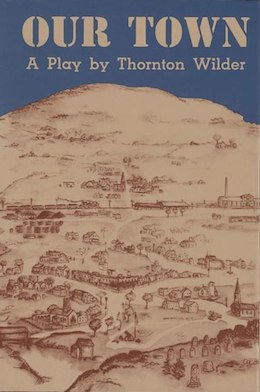Our Town: A Tale of Transience in Rural America
Stripped of scenery, staged with only some chairs and a ladder we enter Our Town. This remains one of the most popular of modern plays. Why did the playwright opt for such minimalism? What constitutes the play’s unfailing appeal? This year, the college’s theatre department is putting on Thorton Wilder’s timeless classic, giving us once again a chance to answer these questions.
 Our Town, first performed in 1938, was written by the American playwright and novelist Thorton Wilder (1897-1975). The piece is set in the fictional town of Grover’s Corners in rural, early twentieth-century New Hampshire. Divided into three acts, the play spans from 1901 to 1913 as it chronicles the everyday life of the town from the perspective of two neighbouring families, the Webbs and the Gibbses. It is organized around the relationship of Emily Webb and George Gibbs, the elder children of the families, who fall in love and marry. In the first act, “Daily Life”, we are introduced to Grover’s Corners. In Act II, “Love and Marriage”, we witness the blossoming of Emily and George’s relationship before confronting loss in the final act, “Death and Dying”. The play’s stark simplicity adds to its distinctly human charm.
Our Town, first performed in 1938, was written by the American playwright and novelist Thorton Wilder (1897-1975). The piece is set in the fictional town of Grover’s Corners in rural, early twentieth-century New Hampshire. Divided into three acts, the play spans from 1901 to 1913 as it chronicles the everyday life of the town from the perspective of two neighbouring families, the Webbs and the Gibbses. It is organized around the relationship of Emily Webb and George Gibbs, the elder children of the families, who fall in love and marry. In the first act, “Daily Life”, we are introduced to Grover’s Corners. In Act II, “Love and Marriage”, we witness the blossoming of Emily and George’s relationship before confronting loss in the final act, “Death and Dying”. The play’s stark simplicity adds to its distinctly human charm.
One possible explanation of Our Town’s minimalism is Wilder’s desire to break with the theatrical conventions of his day in favour of a more “text-based” storytelling. Alternatively, the indistinct setting can be seen as allegorical, suggesting that Grover’s Corner’s represents “Any Town” and its inhabitants embody humanity. It is precisely this human scope and universality of feeling which has led some critics to liken Our Town to ancient tragedy. Reinforcing this idea is the character of the stage manager (essentially the narrator), who comments on the ongoing action, frequently breaks the fourth wall by addressing the audience, and even assumes some roles in the universe of the play. As such, his role has been compared to that of the chorus in Ancient Greek drama, and his interactions with the viewers encourage the latter to invest themselves more deeply in the story.
But what is the relevance of the play? Why should we go see it? Simply put, Our Town teaches us to cherish life by showing us that the root of unhappiness is not valuing the little moments of one’s existence. As Emily remarks sadly in the final act, “Oh, earth, you’re too wonderful for anybody to realize you.” I recently met with Ms. Barbara Kelly, chairperson of the theatre department who is also directing Our Town. When asked what she thinks makes the play so attractive, she answered that it is the glimpse it gives us into a simpler time. “For me,” she said, “the play is about appreciating life and getting away from the busyness and the buzz of our technological world.”
Our Town opens next Thursday at the Dawson Theatre. Performances from March 5th to 6th at 8 p.m., Saturday March 7th (matinée) at 2 p.m. Admission is marked ‘Pay what you can’. For more information:
http://www.dawsoncollege.qc.ca/professional-theatre/2014-2015-season/3rd-studio-our-town/
Featured Image Credits: [url=http://www.wallpaperup.com]http://www.wallpaperup.com[/url]
Bibliography
Ballet, Arthur H. “In Our Living and in Our Dying.” The English Journal 45.5 (1956): 243-249.
Gallagher, Ashley. “Our Town.” The Thorton Wilder Society. twildersociety.org.
“Our Town.” Wilder: The Official Website of the Thorton Wilder Family. thortonwilder.com.

Comments
No comments posted yet.
You have to be registered and logged in in order to post comments!